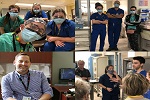The Department of Emergency Medicine is a group of over 40 practicing clinicians and academic faculty members. Dr. David Messenger, Department Head, says, “We provide clinical care at both the Emergency Department at Kingston General and the Urgent Care Centre at Hotel Dieu. Between those two sites we care for about 110,000 patients per year.” This number of patients isn’t just from Kingston, Messenger says. “We are the tertiary referral centre for the region so we provide clinical support and accept transfers from community hospitals requiring further workup and investigations or therapies that aren’t available in the community.” The Emergency Department also serves as the referral centre for cardiac disease, stroke and trauma. “Emergency physicians are experts in assessment, diagnosis and management of undifferentiated acute illness, so we are trained and we see all manner of patient presentations ranging from resuscitation of cardiac arrest to trauma to mental health emergencies to surgical emergencies to provision of palliative care at end of life, so our practice really incorporates the entire breadth of medicine,” says Messenger, “We are fundamentally a group of ‘specialized generalists’ in that we see patients with illness from any domain of medicine but our skillset lies in acute diagnosis of undifferentiated illness, resuscitation of the critically ill, and we incorporate a variety of procedural skills to address all kinds of illnesses and injuries.”
academic faculty members. Dr. David Messenger, Department Head, says, “We provide clinical care at both the Emergency Department at Kingston General and the Urgent Care Centre at Hotel Dieu. Between those two sites we care for about 110,000 patients per year.” This number of patients isn’t just from Kingston, Messenger says. “We are the tertiary referral centre for the region so we provide clinical support and accept transfers from community hospitals requiring further workup and investigations or therapies that aren’t available in the community.” The Emergency Department also serves as the referral centre for cardiac disease, stroke and trauma. “Emergency physicians are experts in assessment, diagnosis and management of undifferentiated acute illness, so we are trained and we see all manner of patient presentations ranging from resuscitation of cardiac arrest to trauma to mental health emergencies to surgical emergencies to provision of palliative care at end of life, so our practice really incorporates the entire breadth of medicine,” says Messenger, “We are fundamentally a group of ‘specialized generalists’ in that we see patients with illness from any domain of medicine but our skillset lies in acute diagnosis of undifferentiated illness, resuscitation of the critically ill, and we incorporate a variety of procedural skills to address all kinds of illnesses and injuries.”
The Department has been a member of SEAMO since its inception. Dr. Messenger says he is most proud of how the Department has been able to maintain a very high standard of clinical care despite significant changes and challenges. “We see between a three and five per cent growth in our patient visits each year and I think despite aging infrastructure, the quality of care we provide remains state of the art.” The Department of Emergency Medicine was the first full academic emergency medicine department to be established in Canada and Dr. Messenger says the Department continues to be well-regarded on the national stage. “We have had a longstanding commitment to excellence in clinical education as one of the oldest and most well-regarded emergency training programs in Canada; despite being a small centre, our Department has always punched above its weight.”
During the COVID-19 pandemic, Dr. Messenger says the focus for the Department has been working as a team. “It’s not just the doctors, it’s a whole team of professionals ensuring the Department functions well. We have an excellent and very large nursing staff with whom we collaborate closely. We have good relationships and work closely with other clinical Departments because we are the front door to the hospital for a lot of their patients,” he says. “COVID has renewed our perspective on that and has brought our team together in an interesting way with a strong sense of shared enterprise and commitment.”
According to Dr. Messenger, the Department of Emergency Medicine is more than just the access point to the hospital: “We are also, for many patients, the safety net under the rest of the healthcare system. The volume and breadth of different presentations we see is enormous and part of our challenge as a Department is helping to ensure there is good access to care for the patients we see, many of whom come from vulnerable or marginalized populations and struggle to find supports elsewhere.”
The Department of Emergency Medicine also has several sub-specialties, in addition to core emergency training. “Our Department has a number of individuals fellowship-trained in critical care medicine, point of care ultrasound, toxicology, resuscitation medicine, and global health. We have been leveraging those skills to create a variety of enhanced clinical and education programs, including fellowship programs. We offer fellowships in resuscitation and global emergency medicine, and this year we’re launching new fellowships in both medical education and point-of-care ultrasound.”
For more information on the Department of Emergency Medicine, visit their website.
